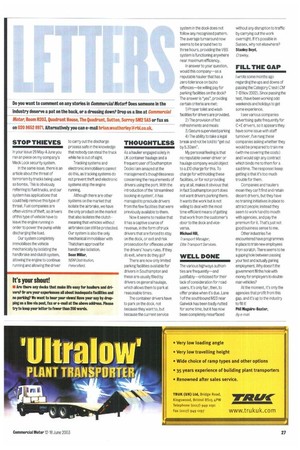Do you want to comment an any stories in Commercial
Page 27

If you've noticed an error in this article please click here to report it so we can fix it.
Motor? Does someone in the Industry deserve a pat on the back, or a dresskig down? Drop us a line at Commercial Motor, Room H2O, Quadrant House, The Quadrant, Sutton, Surrey SM2 5AS or fax us on 020 8652 8911. Alternatively you can e–maN brian.weatherley*rbi.co.uL
STOP THIEVES
In your issue 29 May-4 June you ran an piece on my company's Meck Lock security system.
In the same issue, there is an article about the threat of terrorism by trucks being used as bombs. This is obviously referring to fuel trucks, and our system has applications that could help remove this type of threat. Fuel companies are often victims of theft, as drivers of this type of vehicle have to leave the engine running In order to power the bump while discharging the load.
Our system completely immobilises the vehicle mechanically by isolating the handbrake and clutch system, allowing the engine to continue running and allowingthe driver to carry out the discharge process safe in the knowledge that nobody can steal the truck while he is out of sight.
Tracking systems and electronic immobilisers cannot do this, as tracking systems do not prevent theft and electronic systems stop the engine running.
Although there are other systems on the market that isolate the airbrake, we have the only product on the market that also isolates the clutchmeaning that vehicles without airbrakes can still be protected. Our system is also the only mechanical immobiliser with Thatcham approval for handbrake isolation.
Sean Millar,
NSM Distribution, Petersfield,
THOUGHTLESS
As a haulier engaged solely in UK container haulage and a frequent user of Southampton Docks lam amazed at the management's thoughtlessness concerning the requirements of drivers using the port. With the introduction of the 'streamlined booking-in system', it has managed to preclude drivers from the few facilities that were previously available to them.
Now it seems to realise that it has a captive source of revenue, in the form of truck drivers that are forced to stay on the dock, or exit and risk prosecution for offences under the drivers' hours rules. If they do exit, where do they go?
There are now only limited parking facilities available for drivers in Southampton and these are usually filled by drivers on general haulage, which allows them to park at reasonable times.
The container drivers have to park on the dock, not because they want to, but because the current service system in the dock does not follow any recognised pattern. The average turnaround now seems to be around two to three hours, providing the VBS system is functioning anywhere near maximum efficiency.
In answer to your question, would this company—as a reputable haulier that has a zero tolerance on tacho offences—be willing pay for parking facilities on the dock? The answer is "yes", providing certain criteria are met: 1) Proper toilet and wash facilities for drivers are provided.
2 ) The provision of hot refreshments and meals 3) Secure supervised parking 4) The ability to take a legal break and not be told to "get out by 5.30am".
My personal feeling is that no reputable owner-driver or haulage company would object to a DO charge for this. To charge for withholding these facilities, or for not providing any at all, makes it obvious that in fact Southampton port does not want drivers parking there. It wants the work but is not willing to deal with the most time-efficient means of getting that work from the customer's door to the dock and viceversa.
Michael Hill,
Transport Manager, Elite Transport Services.
WELL DONE
The various highways authorities are frequently—and justifiably—criticised for their lack of consideration for road users. It's only fair, then, to offer praise when it's due. Lane 1 of the southbound M23 near Gatwick has been badly rutted for some time, but it has now been completely resurfaced without any disruption to traffic by carrying out the work overnight. If it's possible in Sussex, why not elsewhere? Stanley Boyd, Crawley.
FILL THE GAP
I wrote some months ago regardingthe ups and downs of passing the Category C test (CM 7-13 Nov 2002). Since passing the test, have been working odd weekends and holidays to get some experience.
I see various companies advertising quite frequently for C+E drivers, so it appears they have some issue with staff turnover. I've rung these companies asking whether they would be prepared to train me (with me covering the costs) and I would sign any contract which binds me to them for a said time. The response I keep getting is that it's too much trouble for them.
Companies and hauliers moan they can't find and retain decent drivers, but they have no training initiatives in place to attract people; instead they seem to work hand to mouth with agencies, and pay the premium for it. That'sjust not good business sense to me.
Otherindustries I've encountered have programmes in place to train new employees from scratch. There seems to be a gaping hole between passing yourtest and actually gaining employment. Why doesn'tthe government fill this hole \iVrth money for employers to doubleman vehides?
At the moment, it's only the agencies that profit from this gap, and it's up to the industry to fill it
Phil Maguire-Baxter,
By e-mail.












































































































































































